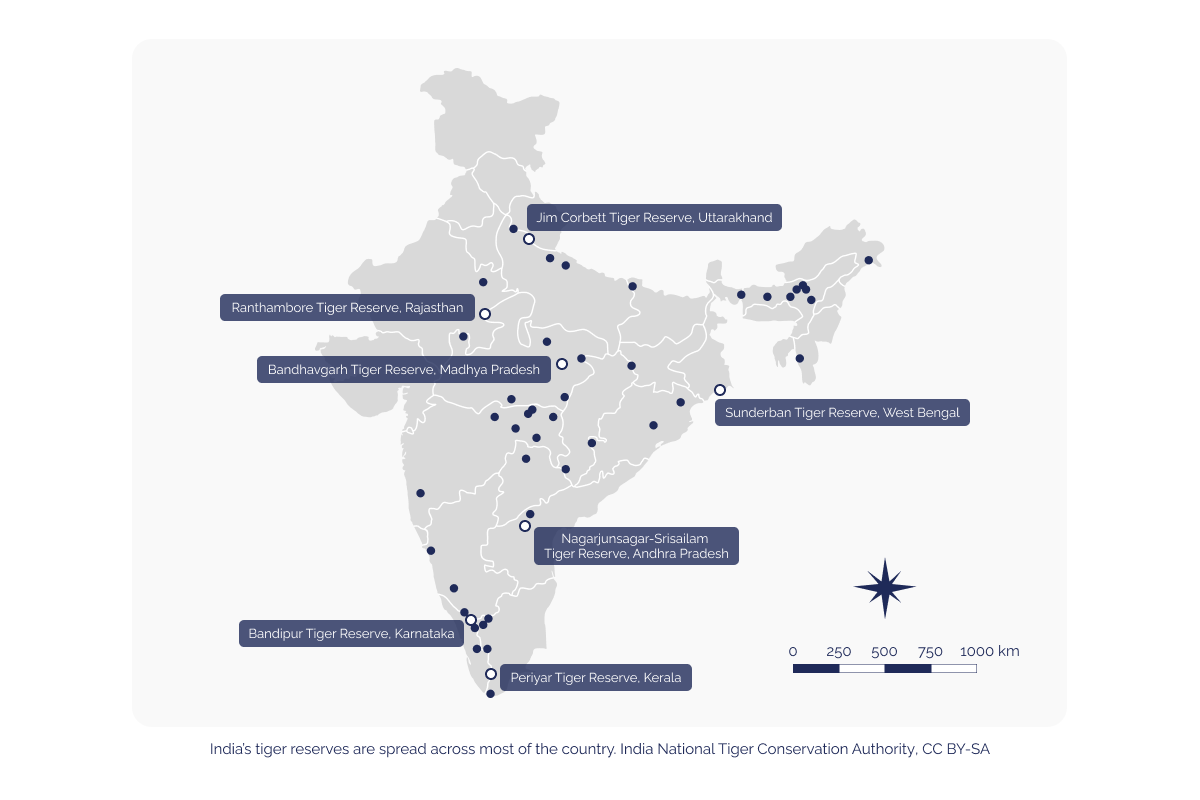India's groundbreaking Project Tiger, designed to rescue the country's iconic big cat from the brink of extinction, has marked its 50th anniversary in 2023. Prime Minister Narendra Modi announced that India now hosts over 3,000 tigers, representing more than 70% of the global wild tiger population.
 Tiger in the nature habitat, India.
Tiger in the nature habitat, India.
Since its inception in 1973, India's commitment to tiger conservation has grown significantly. The country now protects 54 tiger reserves, covering an area exceeding 75,000 square kilometres, approximately 2% of India's land.
New research published in the journal Nature Ecology and Evolution reveals a vital connection between tiger conservation and the quest for environmental protection. Despite the Bengal tiger inhabiting various landscapes such as jungles, mangroves, and dry forests, the common thread is the presence of abundant trees.
According to the study's authors, the strict protection within India's tiger reserves has prevented extensive deforestation. By preserving forests that had otherwise been lost, tiger conservation efforts contributed to avoiding over 1 million tonnes of carbon emissions between 2007 and 2020.
Read more: India to establish carbon market with new draft plan
 Map of India’s tiger reserves.
Map of India’s tiger reserves.
While a million tonnes of carbon is relatively small compared to India's annual emissions of 2.7 billion tonnes, the significance lies in the potential economic value. These avoided deforestation and saved carbon emissions can be seen as direct carbon offsets worth around $6.24 million. When factoring in broader ecosystem services, like watershed management and fuel provision, the figure could rise to $92 million. This revelation opens the possibility of funding tiger protection through carbon offset schemes.
Critics argue that expanding tiger reserves in India is an unnecessary expense, leading to conflicts between animals and humans while criminalising local communities. However, in a world driven by economic considerations, the survival of vulnerable wildlife often depends on its ability to justify its own existence. Incorporating carbon storage as a reason to protect tiger habitats could breathe new life into conservation efforts.
Read more: Reforestation: 10 amazing effects of planting trees
India still possesses substantial available habitat for tigers, despite centuries of deforestation and the expansion of farmland. Tiger biologist Ullas Karanth suggests that India has the potential to quadruple its wild tiger numbers in the long run, with an estimated 380,000 square kilometres of potential habitat. Currently, only 20% of this area is under strict protection and home to tiger populations.
This approach presents a win-win situation, enabling India to restore its environmental credentials while balancing development and business priorities. India's remarkable journey in tiger conservation offers hope for preserving these majestic creatures and protecting the environment through carbon credits.
At DGB Group, we know nature is interconnected, and every action we take has an effect. Whenever we plant a tree, we do so much more: We set the building blocks for creating habitats for numerous species and so much more. DGB is dedicated to supporting nature to thrive through our reforestation, restoration, and community projects that generate high-quality carbon and biodiversity credits.
Join us in our mission




